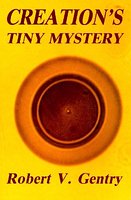| ESA | Return to https://www.halos.com/book/mystery-in-the-rocks-11.htm. | ESA |
A physicist's discovery begins an extraordinary odyssey
through
pride and prejudice in the scientific world.
By Dennis Crews
When the dust settled few were surprised to learn that the ACLU had won. The trial had been theirs from the beginning. People in attendance had seen primarily what the scientific establishment wanted them to see, and when it was over things stayed pretty much that way. Discover magazine's cover story on the trial, "Judgment Day for Creationism," was derisively subtitled: "In a showdown in Little Rock, creationists defend their scientific claims—badly" (February 1982). On the day after the trial closed ACLU attorney Bruce Ennis was quoted in the Arkansas Democrat: "The state tried to prove there is scientific evidence for creation. They failed not because of a lack of effort, but because that evidence does not exist." Few readers had any way of knowing how much relevant information had been either deftly discredited by the ACLU strategists or spiked altogether by the media afterward.
Judge William Overton's evaluation of Gentry's research was heavily influenced by the testimony of geologist Dalrymple, a witness who had not even studied Gentry's work in the scientific literature. Overton's judicial opinion stated the research to have been "published almost ten years ago and have been the subject of some discussion in the scientific community. The discoveries have not, however, led to the formulation of any scientific hypothesis or theory which would explain a relatively recent inception of the earth or a worldwide flood. Gentry's discovery has been treated as a minor mystery which will eventually be explained. It may deserve further investigation, but the National Science Foundation has not deemed it to be of sufficient import to support further funding."27
Judge Overton's opinion inferred that other scientists could find nothing of significance in Gentry's discovery, when in fact his work had such troubling implications that silence was the only weapon they could turn against him effectively. The crowning irony of his opinion was this criticism of creation science: "The methodology employed by creationists is another factor which is indicative that their work is not science. A scientific theory must be tentative and always subject to revision or abandonment in light of facts that are inconsistent with, or falsify, the theory. A theory that is by its own terms dogmatic, absolutist and never subject to revision is not a scientific theory."28
This was a most disturbing statement. The simple fact was that Robert Gentry's work exemplified science at its highest level. After discovering a natural phenomenon that seemed to contradict accepted theory, he reserved final judgment and set out with relentless energy to resolve the incongruity. Using the most sophisticated research techniques he methodically exhausted every possible avenue for a conventional explanation of the problem, publishing his results in the open scientific literature for all his colleagues to scrutinize—meanwhile becoming the world's foremost expert in his field. The facts of his discovery continued to confound evolutionary science. No one had ever produced a shred of evidence that contradicted either his findings or his conclusions.
Judge Overton's opinion was far more applicable to the science establishment, whose attitude countered Gentry's with a perverse symmetry. They unequivocally refused to reckon with facts that did not fit the evolutionary model. Indeed, they failed to meet their own criterion of scientific objectivity at its most fundamental level—even going so far as to discredit an honest scientist who brought coercive evidence against evolution to light. They cherished and defended the doctrine of evolution with religious zeal, protecting it from contradiction even at the cost of truth itself.
Retribution for Gentry's participation in the trial was not long in coming. The January 1 and 8 issues of Science contained a special report on the trial by reporter Roger Lewin. A careful reading of his article revealed subtle inaccuracies that cast the state's witnesses in an unfavorable light. Omission of key phrases and twisted bits of testimony effectively portrayed Robert Gentry as a person who himself did not consider creation science to be true science, and who admitted that his research conclusions were inspired by the Bible—both serious misrepresentations. The article also contained a number of damaging perversions of the exchange between Gentry and his cross-examiner that could not be verified until four years later, when Gentry finally obtained an audio tape of the proceedings. By then it was far too late.
Lewin's article in Science made it imperative for Gentry to respond promptly with an attempt to clarify his position on several critical points. Such rebuttals are customary in scientific journals, particularly when the credibility of individuals hangs in the balance, but this time no such courtesy was extended. The editor simply stated, "While it is understandable that you might have preferred a different emphasis or different details in Lewin's account of your testimony, we do not find that, in this case, his presentation needs clarification." The damage to his reputation would never be undone.
27 William Overton, 1982. Memorandum Opinion. Little Rock: U.S. District Court.
28 Ibid.
|
© 2009
Earth Science Associates
